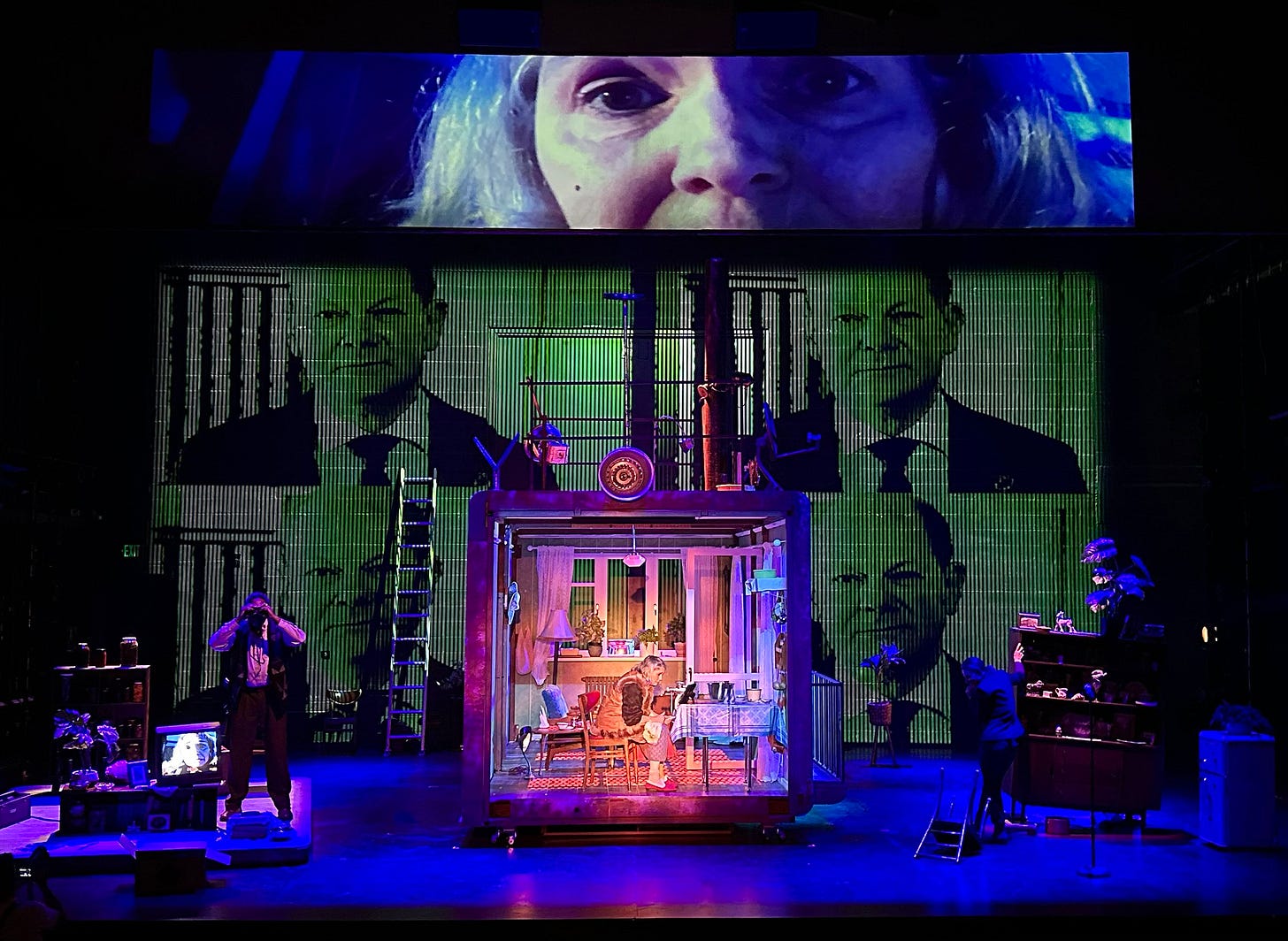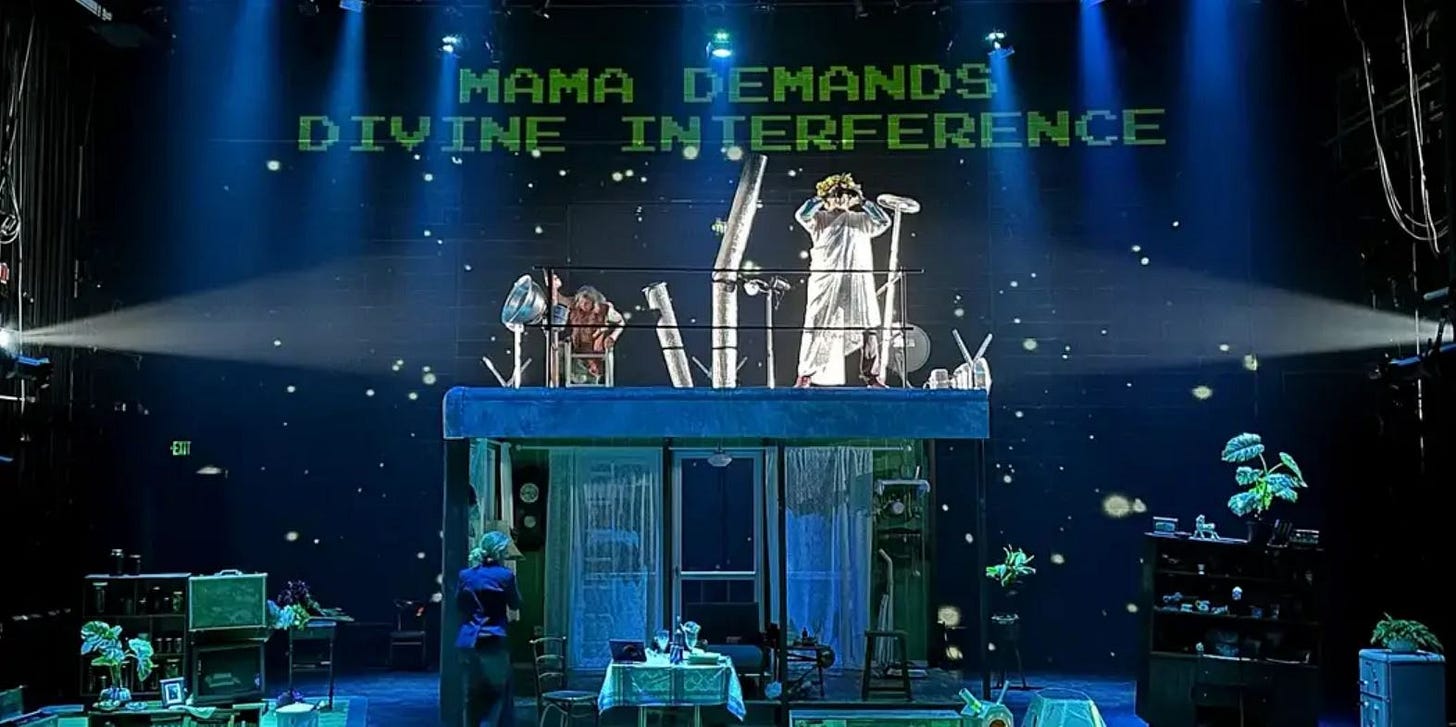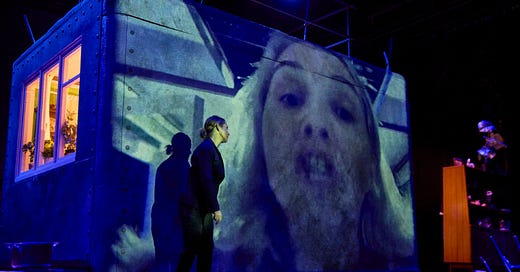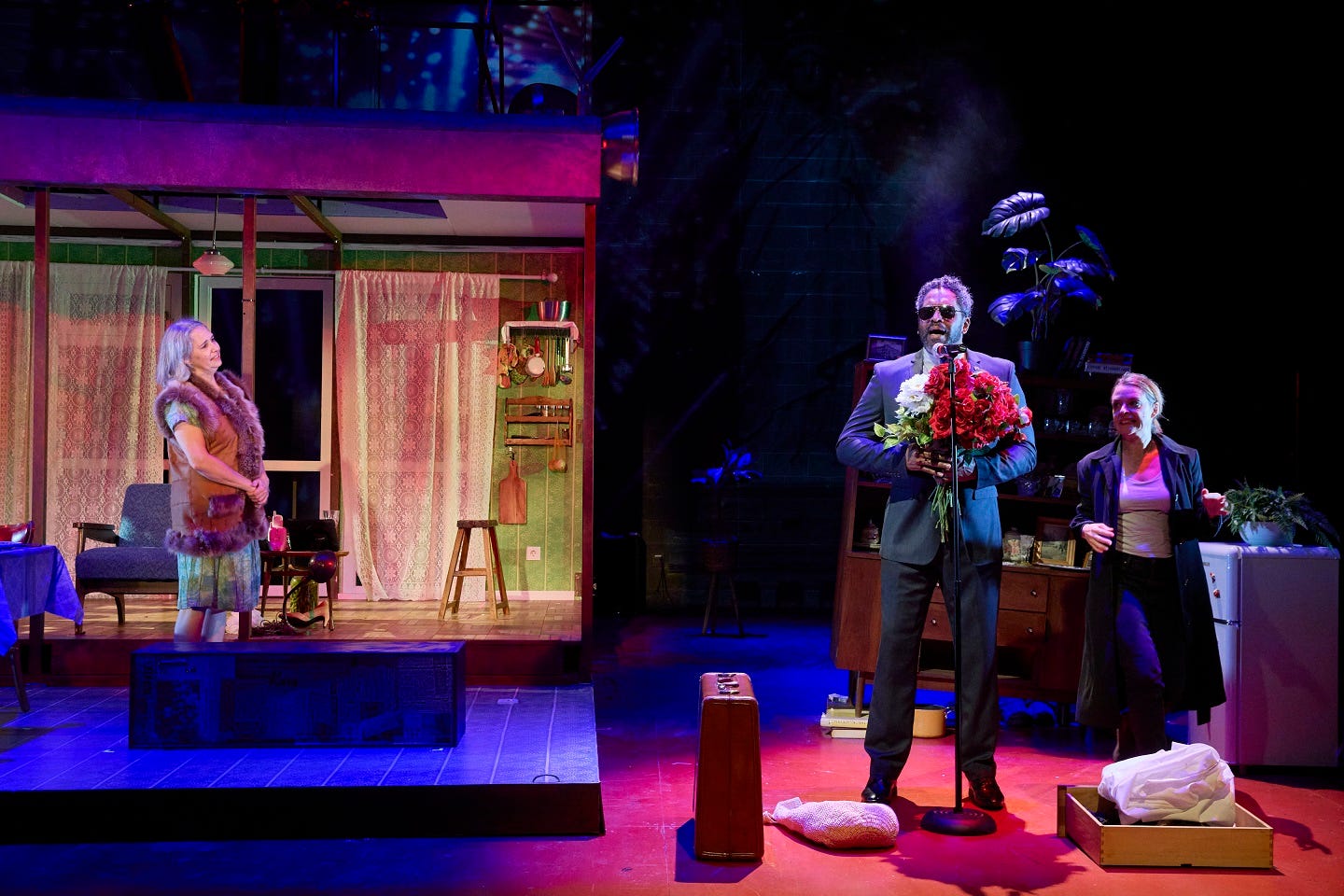My Mama and the Full-Scale Production
The Wilma and Wooly Mammoth co-produce a piece of propaganda. Read to the end for a note on the new leadership at Williamstown.
Before we proceed, please take a few minutes to read E. Alex Jung on Victor I. Cazares’ HIV medication strike against New York Theatre Workshop. This is an important story. Cazares’ staggering courage sets the moral failure of many American theaters into sharp, stark relief.
I’ll admit it. I’ve been slacking, down with two colds in three weeks. I saw this one while it still had a week left in the run, two weeks ago. But are any of you really using this to decide what shows to see? If you are: sorry, and also, wow I love that. There’s a lot that can be written about a show immediately, but a little time provides space for that extra juice. I’m going to try to give you the best of both worlds in the coming months.
My Mama and the Full-Scale Invasion
at the Wilma, a co-production with Woolly Mammoth
by Sasha Denisova
adapted by Kellie MeCleary
directed by Yury Urnov
Not recommended, with redeeming qualities:
This is a mess of a play that lacks both stakes and a coherent internal logic. It isn’t redeemed by the solid performances nor a complicated set design, with projections gilding the lily.
My Mama is both a memory play and a dream play, as the Daughter (played by Suli Holum), better known as Sasha (our playwright) recalls stories from her youth (and her mother's youth), and imagines her mother as an important figure in the on-going war against Russia. She is constantly introducing the latter with, “I imagine my Mama…” which both explains to us what we're about to see but also takes away any stakes the situation might have by reminding us that it is only imaginary. The text is inspired by text messages from her mother, Olga, sent via WhatsApp from her apartment in Kyiv, which she refused to flee. So the source material is already at a remove from the war, and Denisova writes from abroad. The real terror of war is far off, even when the play tries to remind us of it.
The show often feels as if it was written as a monologue, and the scenarios Daughter narrates have been exploded out into fully acted scenes without stripping away the now unnecessary framing devices. While we get a lovely and full portrait of the playwright’s mother, Olga, we also get a play that fundamentally lacks drama.
An even bigger problem is that much of the show just isn't funny, even though director Yury Urnov describes humor as so essential to the play that, “it often feels like a stand-up act performed amidst the trenches.” Which is bizarre, as the show never once makes you feel like you’re in a trench. Its touching and serious moments are few and far between, such as when Mother (Holly Twyford, in town from D.C.) falls in love with a doctor (Lindsay Smiling, who in a virtuosic performance plays nearly every character in the show besides Mother and Daughter, and is listed simply as “Man”) ends up taking a deadly dose of radiation as a responder to the disaster at Chernobyl.
Perhaps surprisingly, the show has two credited co-dramaturgs, the Wilma’s associate artistic director, Kellie MeCleary (who is also credited as adapting the show) and Wooly Mammoth's director of New Work, Sonia Fernandez. Misha Kachman, the translator, is also the production’s scenic designer. It makes me wonder if the show suffers from having too many hands in the pot. I often felt like it was missing the touch of a playwright, especially to sharpen the comedy (in case you think I mean disrespect to the writing capabilities of dramaturgs writ large here, note that MeCleary typically describes herself as producer first, and dramaturg third. Of course, I do have a bias: I want playwrights to be given writing work). I suspect the biggest issue here is that Urnov has been given too much money (why is there a turntable? why are there so many video feeds? what’s the point of all these projections?) and, more importantly, is too in love with the play to see its faults. “I’m currently obsessed,” he wrote in American Theatre magazine.
Fortunately, the whole affair clocks in at under 90 minutes (though that is a long 90 minutes).

There's something about the show that comes off as trite, with that the march toward Kyiv, which only lasted six weeks, nearly two years ago, and with a vastly more brutal war unfolding in Gaza. The terror Mother faces, amped up to the fantastical in Sasha’s imagination, pulls away from the possibility of showing us the banal horrors of war. Though there’s still of course the occasional missile strike, an ever-present threat that the play never takes more than a few beats with, we know that Kyiv isn’t going to be leveled by this war. Nevertheless, why should we imagine war as a madcap romp? How can we? How dare we.
Given that the war in Ukraine is at an apparent stalemate, or at least near a locked state of brutal trench warfare while Western interest is beginning to wane, the show also comes off as sad. What else could it be, to be asked to hope for victory and to laugh in the face of horror, when the reality is so different? The play is so much so about the moment in which it was conceived and written that maybe we’re just too far removed from it now for it to work. Too much more of the war’s story has been written. I can imagine it being more successful, or at least less trite, when it was at Wooly Mammoth in September. The world looked different then. Urnov writes of the invasion, that he feels “it puts the entire world on the edge of survival.” A Russian, he makes no secret of his wish for a Ukrainian victory. Nor does the play, “Slava Ukraini” and “Glory to the Heroes” and all. And neither do I, a Ukrainian-American. But I don’t believe American theaters should be in the business of propagandizing for foreign governments at war. Or for war at all. But that’s what much of the show boils down to, even if there’s a story of a mother and a daughter buried underneath it.
One thing Mother does several times is fight back against the invaders. Daughter even imagines her octogenarian going on a bombing run against the Kremlin. There is no question here, not even a slip of doubt, that armed resistance—even going on the offensive—is anything but justified against a war of aggression and occupation.
Late in the show, Lindsay Smiling dons a pair of aviator glasses and does a Joe Biden impression, the President having come to break bread with Mother. Parts of the audience loved the impression—which was bad, a fast-talking, stiff-walking mishmash of several recent presidents, Biden not standing out among them—and seemed to be a highlight of the show. But the funniest moment in the show (in fact, the only time I distinctly remember laughing at a joke) comes a few scenes later, when Smiling breaks character and mutters a series of complaints about how many parts he has to play in the show, while going from playing an alien (!) to playing God (!!). Another highlight is when Holum dons a Putin mask and does some excellent mask work, playing against both Mother and Biden and injecting some much needed tension into the air (the show often caricatures Putin,1 at one point portraying him as a mosquito in the video design by Kelly Colburn). But this moment made me wonder, where has this energy been the whole show? Even a silly show needs tension.
Mother interacts with several other world leaders, asking Emmanuel Macron and Olaf Scholz for aid. Scholz is portrayed at first by a short looping gif in the projections, but when he appears for a second time both he and Macron are played by Smiling, or rather, their face is grafted onto Smiling’s (or is Smiling grafted onto them?) as he speaks and emotes. The deepfake is a distracting, uncanny effect, one that also flattens Smiling’s performance and removes an opportunity for a feat of comic acting. It’s also a technology that is deeply ethically dubious and everyone in the performing arts should think long and hard before using it.

The show ends on a deeply sentimental note, with Mother finally saying how much she loves her daughter and hasn't said it enough. It's a nice moment, but it doesn't tie what we just witnessed over the last hour and a half together. I understand the play’s, and Urnov’s, impulse to reach for absurdist optimism, but there’s nothing optimistic about war.
In other news:
Williamstown Theater Festival, with the specter of controversy and their season collapsing into a shadow of its old self following a reckoning with wages, thanks to a revolt by their long-underpaid apprentices on which they rely, has hired two new managing directors.
“We are embarking on a journey of transformation. We’re building toward a sustainable future with an equitable model at its core, supporting continued growth for artists and staff, curating dynamic experiences for audiences near and far, and practicing audacious creativity that drives innovation and excellence in its many forms. We look forward to sharing the details of WTF's new vision and 2024 Season in the coming weeks. There’s so much more to come—more clarity, more exploration, more work, more joy, and on and on. We’re so energized and inspired by where we’re heading, and we can’t wait to embark on this journey together with you.”
All well and good, I suppose, even though there’s enough management buzzwords to render the paragraph devoid of meaning. But then you remember these two new managing directors are both white guys. Raphael Picciarelli is a branding consultant with a little theater company and a degree from NYU Tisch. He comes from Wolff Owens where he was recently on the team that rebranded the New York Botanical Garden and helped them get a, uh, new font and color schema that looks extremely 2017 (maybe he’ll try to do something about, uh, “WTF”). Eric Gershman is a management consultant (he first came on board at WTF as a consultant a year ago) who went to Emerson and has an MBA and MFA from Yale.
So these aren’t just white guys, they’re white guy business consultants who come out of elite institutions. The very image of “transformation,” surely. It’s all a little bit on the nose, if you ask me.
And, in other news out of the Berkshires, congratulations to my friend Genee Coreno on her appointment as Artistic Director at WAM Theater.
Anti-Putin caricature is something My Mama and the Full-Scale Invasion shares with Rajiv Joseph’s awful Describe the Night, which had productions at Wooly Mammoth and The Wilma in 2019 and 2020, respectively.






